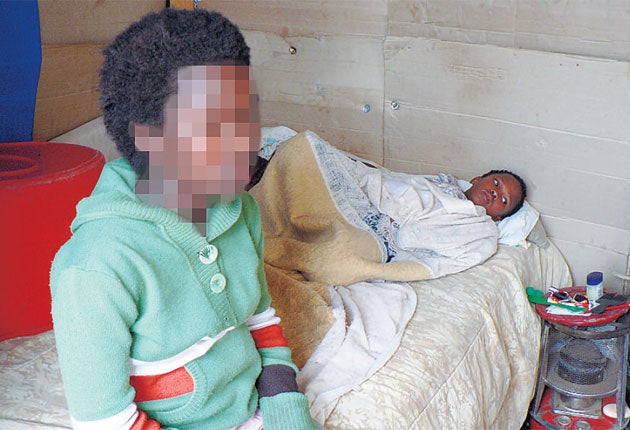South Africa's shame: the rise of child rape
As the global spotlight turns on the World Cup host, charities demand action as 200,000 children are assaulted a year

Tears stream down 11-year-old Ntombizanele's face and drip on to the coarse blue wool of her school uniform. She looks down at the dirt floor of the corrugated iron shack which she shares with her mother and four siblings, and begins to speak.
"I tried to get away, and begged them to leave me alone," she said, her voice wobbling. "He dragged me to the floor and did dirty things to me. I tried to get away, but I'd started bleeding. I was so scared."
Raped by two local teenagers, Ntombi suffered physical and mental wounds that were exacerbated by the treatment she received from the police and neighbours. Ostracised by friends in the large South African city of Port Elizabeth, many of whom believe that she should have kept quiet about the incident, Ntombi has since been threatened with further violence by her attackers, who were released on bail by police.
"One of them said he's going to murder me," she said, wrapping her skinny arms around herself. "It hurts so much when I see them."
While Ntombi's story is disturbing, in South Africa it is also commonplace. The country has the world's highest incidence of rape; a girl born there today has a one in three chance of finishing school, and a one in two chance of being raped. The stories behind these statistics are explored in the documentary Dispatches: The Lost Girls of South Africa, to be screened next Sunday at 9pm on Channel 4.
Like a third of the 200,000 children who are raped in South Africa every year, Fuzeka, 12, was attacked by a close relative. Staring straight ahead, she recounts how her father indecently assaulted her, and told her that when he slept with her he would use a condom as he is HIV positive.
"I can't believe my father wants to sleep with me," said Fuzeka, close to tears. "I stay awake to be sure that he doesn't come into my room."
Her mother, her gaunt face a sign of Aids, also weeps as she recounts her husband's justification: "My child cannot sleep with other men until I have slept with her first."
In order to get away from her father, Fuzeka's mother moved her and her younger sister into a tiny wooden shack with no electricity, running water nor toilet. Like eight million South Africans, they are forced to live in a crowded, informal settlement. Some experts believe that such living conditions – with children sharing rooms and beds with adults – and high levels of drug and alcohol use are two factors facilitating the sexual abuse. Social attitudes towards sex are also thought to contribute to the high incidence of rape.
"For many men, sex is an entitlement, they've de-linked it from love and pro-creation; it has become about one's own gratification," said Joan van Niekerk, a manager for Childline South Africa. The charity says that 80 per cent of the rape cases it deals with involve victims under 13. "We need programmes for boys which celebrate masculinity from a point of view of protecting, caring, and managing appetites."
A 2009 survey by the country's Medical Research Council found that one in four men admits to raping someone; while 62 per cent of boys over 11 believe that forcing someone to have sex is not an act of violence, with a third believing that girls enjoy rape.
The government – led by President Jacob Zuma, who was tried for rape in 2006 – has been criticised for not tackling the problem and police and judicial failings have been highlighted.
But for many victims, worries that their rapist will go unpunished are secondary to a much bigger fear: that they may have contracted HIV. South Africa has the highest number of people infected with the virus in the world – 5.7 million people have HIV or Aids.
The eyes of the world will be on South Africa next month, when more than 350,000 football fans will arrive for the World Cup. Many charity workers fear that this will make children even more vulnerable to sexual violence and a national campaign by Unicef will try to raise awareness of the issue.
Deborah Shipley, the director of the Dispatches documentary, said that the girls who took part were also hoping to highlight the issue: "They felt very strongly that it is an outrage which should be stopped, and by talking about it they could help."
To learn more and find out how you can help got to lostgirlssa.org a website set up by the film-makers to help the children featured in the film. The Lost Girls of South Africa, Sunday May 23rd, 9pm, Channel Four.
Join our commenting forum
Join thought-provoking conversations, follow other Independent readers and see their replies
Comments
Bookmark popover
Removed from bookmarks